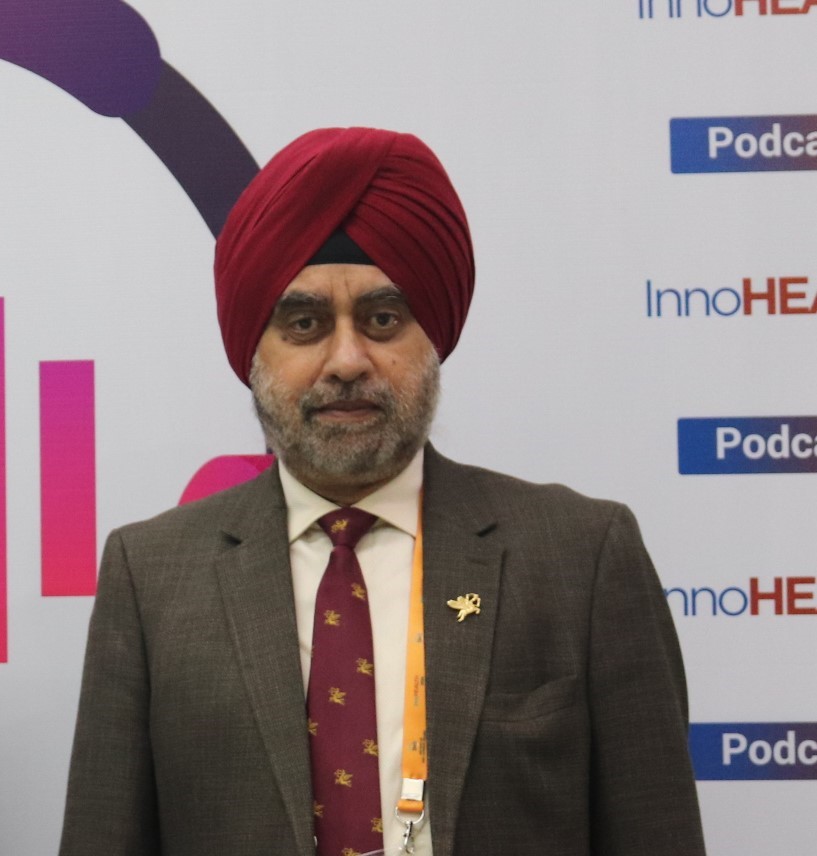
Healthcare is an ever-evolving field, constantly shaped by technological advancements, innovative approaches, and sustainability measures. At InnoHealth 2024, Major General Dr. Jagtar Singh (recipient of the Vishisht Seva Medal) shared valuable insights on the progress, challenges, and opportunities in the healthcare sector. In a conversation with Anjali, host of the InnoHealth Magazine podcast, he provided a detailed perspective on sustainability, innovations, and international best practices that can be adapted in India.
Sustainability in Healthcare: Challenges and Progress
When asked about sustainability in healthcare, Dr. Singh acknowledged the significant strides made but emphasized that there is still much work to be done. He pointed out that sustainability varies depending on the context—what works in a metropolitan setting differs from what is required in resource-constrained environments, such as those encountered in the armed forces. Both scenarios present distinct challenges, yet progress has been made in both civilian and military healthcare systems.
Innovations in Healthcare: A Dual Perspective
Dr. Jagtar categorized healthcare innovations into two broad areas:
- Hospital- and Administration-Facing Innovations – These focus on improving operational efficiency, enhancing clinical accuracy, and streamlining administrative workflows.
- Patient-Facing Innovations – These address challenges patients face daily, such as appointment scheduling, medication guidance, follow-ups, and discharge procedures.
While significant progress has been made in clinical and administrative innovations, he stressed the need to focus on patient-centered innovations. The core question, he noted, is whether the healthcare system is genuinely addressing patients’ everyday challenges and making the healthcare journey more accessible and efficient.
International Healthcare Innovations: Lessons for India

Drawing from his experience on a study mission to the United States, he shared key takeaways from visiting award-winning hospitals recognized for healthcare excellence. One common theme among these institutions was their unwavering focus on streamlining healthcare delivery through well-defined processes.
A notable example was MD Anderson Cancer Center in Texas, where patient care for women with cancer was meticulously structured. Everything from specialist consultations to diagnostic services and allied medical support was centralized on a single floor, ensuring seamless healthcare delivery. This level of organization, he suggested, is something India must work toward—shifting the focus from fragmented structures to optimized processes that enhance the patient experience.
The Need for Process-Oriented Healthcare

Dr. Jagtar referenced the Donabedian model of healthcare quality, which consists of three key elements: structure, process, and outcomes. While hospitals often emphasize infrastructure (structure) and performance metrics (outcomes), he pointed out that the real challenge lies in refining hospital operations (processes). By concentrating on processes, hospitals can significantly improve efficiency, reduce patient wait times, and enhance overall healthcare quality.
One critical issue he highlighted is the tendency of healthcare institutions to design systems based on administrative convenience rather than patient needs. He urged a reorientation toward patient-centric healthcare, ensuring that every operational change considers its impact on those receiving care.
Final Thoughts
Dr. Jagtar’s insights shed light on the crucial aspects of innovation and sustainability in healthcare. From recognizing the importance of patient-centric solutions to adapting global best practices, his perspectives underscored the need for a more streamlined and process-driven approach in India’s healthcare system.
InnoHealth 2024 provided a platform for meaningful dialogues like this, paving the way for a future where healthcare in India becomes more innovative, sustainable, and patient-focused.
Composed By
InnoHEALTH magazine digital team

